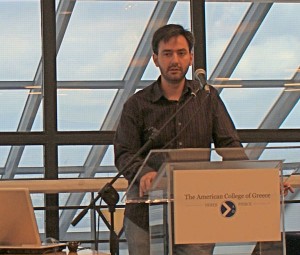Rationale
Learning Analytics is an emerging and promising discipline in educational research, especially in IT-supported learning processes. In fact, according to Johnson, Adams and Cummins (2012), its estimated time-to-adoption horizon is set in no more than three years.
Ferguson (2012) defined Learning Analytics as “the measurement, collection, analysis and reporting of data about learners and their contexts, for purposes of understanding and optimizing learning and the environments in which it occurs “. Despite the generality of the previous definition, it is proving difficult to set a common ground for the study of Learning Analytics, since this term has different meanings for different people (Anderson, 2003; Van Barneveld, Arnold, & Campbell, 2012), and shares many attributes with Educational Data Mining (Siemens & Baker, 2012).
Nevertheless. there is agreement in that its objective is to achieve useful information and knowledge about learning processes and relations among learning agents in order to improve individual and institutional teaching and learning, by analyzing learning-related data through the use of data extraction, data mining and other data processing techniques, such as data visualization.
However, the use of Learning Analytics should not only be limited to quality measurements or specific interventions; instead, it should be a tool for strategic planning in educational institutions (Macfadyen & Dawson, 2012). Therefore, and more generally, we may consider analytics in educational contexts as an enabler for data-driven decision making at all levels (Van Barneveld, Arnold, & Campbell, 2012), ranging from specific actions focused on individual students –e.g. at risk students– to course-level actions –e.g. course planning, structure and contents– and to institutional educational policy making.
Consequently, very high expectations are set on the future of Learning Analytics. And this raises a critical question: how is it possible for Learning Analytics to meet these expectations?
Topics
In order to answer that fundamental question, this Call for Papers is open for relevant contributions in the following fields, each corresponding to a Conference sub-track:
- Research frameworks for Learning Analytics: state of the art reviews and theoretical and exploratory conceptual frameworks.
- Approaches to Educational Data Mining: algorithms, methods and applications for data extraction and processing.
- Learning Data Visualization: display of visual information for Learning Analytics.
- Using Learning Analytics for decision making: data-driven policies, results from experiences and best practices.
- Future directions and new paths for Learning Analytics.
Paper language
English
Presentation
Full papers shall be submitted for participation in the different sub-tracks.
Contributions will be presented in separate sessions for each sub-track*.
The different sessions will be held as panels consisting of a maximum of six presenters, and moderated by the co-chairs.
For each session, authors will briefly present an overview of their submission, with a maximum time allowance of five minutes. This presentation shall not be a summary of the submission but rather a general context of their research.
Following the presentations, the moderators will start a debate with the authors addressing the main contributions of each paper, focusing on common and divergent points. This debate will have a duration of between forty-five and sixty minutes, and may include active participation from the audience via social networks –e.g. microblogging tools–. At the end of the debate, an open round of questions will be held, with a maximum of thirty minutes.
* Although only one session per sub-track is planned, more sessions may be allocated depending on the number of papers accepted in each sub-track.
Language: English
Submission
Submission dates: http://teemconference.eu/2013/dates/
Submission format: http://teemconference.eu/2013/submission/
Submissions must be done through https://www.easychair.org/conferences/?conf=teem2013, choosing this track before to proceed.
Track Scientific Committee
Miguel Ángel Conde-González, Ph.D. (Universidad de León, Spain) – Co-chair
Ángel Hernández-García, Ph. D. (Universidad Politécnica de Madrid, Spain) – Co-chair
Sergio Araya Guzmán, Ph.D. (Universidad del Bío-Bío, Chile)
Adam Cooper, Ph.D. (University of Bolton, United Kingdom)
Daniel Domínguez Figaredo, Ph.D. (Universidad Nacional de Educación a Distancia, Spain)
Rebecca Ferguson, Ph.D. (Open University, United Kingdom)
Antonio Fumero Reverón, Ph.D. (Escuela de Organización Industrial, Spain)
Santiago Iglesias-Pradas, Ph.D. (Universidad Politécnica de Madrid, Spain)
Mark Johnson, Ph.D. (University of Bolton, United Kingdom)
Nic Nistor, Ph.D. (Ludwig-Maximilians Universität München, Germany)
Roberto Theron, Ph.D. (Universidad de Salamanca, Spain)
Stefan Trausan-Matu, Ph.D. (Universitatea Politehnica din Bucuresti, Romania)
(To be completed)
Special Issue
The accepted papers in this track will be invited to prepare and submit an extended version to be considered, after a new peer review, for publication in a Special Issue in Computers in Human Behavior (http://www.journals.elsevier.com/computers-in-human-behavior)
More info

Dr. Ángel Hernández García
Universidad Politécnica de Madrid
Spain
 (+34) 91 5475900 (ext. 2112)
(+34) 91 5475900 (ext. 2112)
 angel.hernandez@upm.es
angel.hernandez@upm.es
